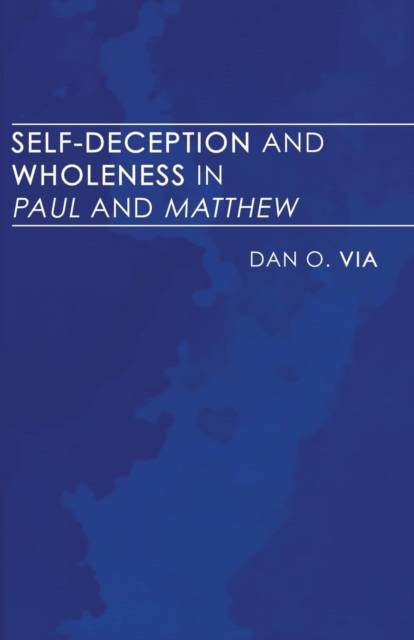
- Retrait gratuit dans votre magasin Club
- 7.000.000 titres dans notre catalogue
- Payer en toute sécurité
- Toujours un magasin près de chez vous
- Retrait gratuit dans votre magasin Club
- 7.000.000 titres dans notre catalogue
- Payer en toute sécurité
- Toujours un magasin près de chez vous
36,45 €
+ 72 points
Description
Via uses the concept of self-deception as a vantage point for understanding something about Paul and Matthew. Employing an existential method in the broad sense, Via asks about the nature of a pervasive phenomenon of human existence with some attention given to psychological aspects. Nevertheless, this study is primarily exegetical and interpretive -- aimed at theological understanding -- rather than intensively methodological. Positing that self-deception is a deformation, Via undertakes to pay attention primarily to the subversion of the self and the recovery of wholeness. Additionally, attention is paid to self-deception as a social phenomenon and some consideration is given to its social causes and implications. Posing provocative questions to the New Testament, Dan O. Via asks how Paul and Matthew understand the near universal human experience of self-deception and shows how each of them, in a different way, proclaims the power of the gospel to break through illusion and bring personal integration to the believer-disciple. . . . Via's strategy has two benefits for the preacher or interpreter: it formulates the biblical message in terms accessible to [contemporary] readers who might not otherwise be disposed to listen, and it offers a fresh approach to vexed questions about the theological coherence of the New Testament canon. . . . Via's work out to stimulate lively conversation. --Richard B. Hays author of 'The Moral Vision of the New Testament' Via achieves his extraordinary penetration of these central Christian texts by first honing his analytic tool in the disciplines of philosophy, literary criticism, and psychology. This insightful development of existential interpretation takes New Testament theology and ethics in a promising new direction. --Robert Morgan, Oxford University author of 'Biblical Interpretation' A mature and incisive work dealing with a perennial concern and offering fresh perspectives not only on Paul but also on our own world as well. . . . I found the comparisons of Paul and Matthew both illuminating and insightful. --Calvin Roetzel, Macalester College author of 'Paul: The Man and the Myth' Professor Via proves himself again a valiant wrestler with the truth. . . . This work is subtle and penetrating. --W. D. Davies, Duke University author of 'The Setting of the Sermon on the Mount' Dan O. Via is Professor Emeritus at The Divinity School, Duke University. He is also author of 'The Parables, ' 'The Ethics of Mark's Gospel, ' and 'What Is New Testament Theology?'
Spécifications
Parties prenantes
- Auteur(s) :
- Editeur:
Contenu
- Nombre de pages :
- 180
- Langue:
- Anglais
Caractéristiques
- EAN:
- 9781597523967
- Date de parution :
- 18-10-05
- Format:
- Livre broché
- Format numérique:
- Trade paperback (VS)
- Dimensions :
- 147 mm x 216 mm
- Poids :
- 231 g







